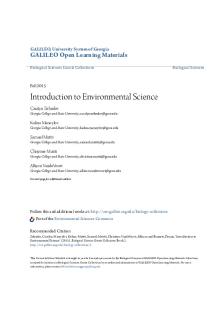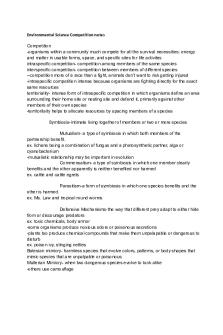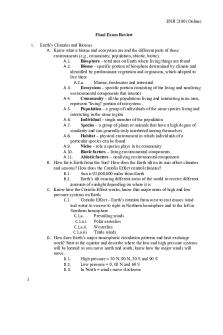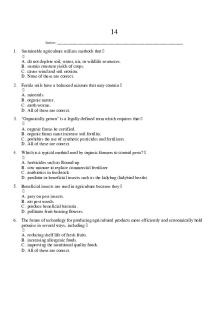2021-intro to environmental science lec 4 policy, ethics, and worldview notes docx PDF

| Title | 2021-intro to environmental science lec 4 policy, ethics, and worldview notes docx |
|---|---|
| Course | Intro to Environmental Science |
| Institution | Rutgers University |
| Pages | 4 |
| File Size | 64.1 KB |
| File Type | |
| Total Downloads | 43 |
| Total Views | 148 |
Summary
2021-intro to environmental science lec 4 policy, ethics, and worldview notes docx...
Description
Intro to Environmental Science Lecture 4: Policy, Ethics, and Worldview
Environmental Justice o Ideal: every person is entitled to protection from environmental hazards o Studies: large share of polluting factors, incinerators, and landfills in the United States Located in African American, Asian American, Latino, and Native American communities o Environmental justice movement – growing grassroots effort to address inequalities Differing Environmental Worldviews o Environmental worldviews – beliefs about how the natural world works and how people should interact with it Differ on importance, human needs/wants vs overall health of ecosystems/biosphere Scope of concern for different environmental worldviews Biosphere Biodiversity Ecosystems All species on earth All people on earth Community and friends Family Self Human-centered environmental worldview – humans are #1 Focus: needs/wants of people o Planetary management worldview Can/should manage earth for our own benefit No-problem school Free-market school o Stewardship worldview – have a responsibility to be caring stewards Criticisms: o Assumes we can always be good stewards – we do not always know enough about the earth o Unregulated global free market approach will degrade and deplete natural capital Life-centered/earth-centered All species have value and humans should not hasten the extinction of other species Natural capital exists for all species, not just humans and should be preserved for all current and future life Environmental wisdom worldview o We are part of community of life and the ecological processes that sustain all life
o Use lessons from nature (environmental wisdom) to guide us o Not in charge of the world o Subject to nature’s scientific laws which cannot be broken 2000: UN earth charter o Respect earth/life in all its diversity o Care for life with understanding, love, compassion o Build societies that are free, just, participatory, sustainable, and peaceful o Secure earth’s bounty for present and future generations o Prevent harm to environment o Eradicate poverty as an ethical, social, environmental imperative o Environmental ethics Beliefs about what is right and wrong in our behavior toward the environment Differing worldviews can influence ethics concerns Role of Government in Making Sustainable Society Transition o Government policies Protect environmental/public interests Encourage more environmentally sustainable economic development o Delicate balance between free enterprise and government intervention o Government is best mechanism to deal with: Full-cost pricing, market failures, tragedy of the commons o Serving environmental/public interests Policies – laws/regulations/funded programs Environmental policy Policy life cycle stages Problem recognition Policy formulation Policy implementation Policy adjustment o Democratic process – politicians focus on short-term problems Special-interest groups pressure the government Profit-making organizations NGOs Labor unions Trade associations Policy Creation o Enacting laws, funding programs, writing/enforcing rules Complex process affected by political processes o Individuals can work together to become part of political processes that influence environmental policies o Budgeting appropriates funding needed to implement and enforce each law o Government department/agency must draw up regulations to implement the law
Lobbyists – person/group that tries to persuade legislators to vote or act in their favor Regulated businesses try to have their members appointed to regulatory agency – revolving door effect Politics >> environmental science Principles of Policy-making o Precautionary o Prevention o Reversibility – avoid decisions which cannot be reversed o Net-energy principle – avoid energy technologies with low/negative net energy yields o Polluter-pays – ensure polluters bear the cost o Environmental justice principle – no group should have unfair share of burden o Triple-bottom-line principle – balance economic, environmental, social needs Environmental Law – body of laws/treaties which broadly define what is acceptable environmental behavior o Most environmental lawsuits are civil suits Injunction Class action suit Negligence o Legal standing o Very expensive o Public interest law firms – cannot recover attorney’s fees o Plaintiffs must establish that harm has been done Influencing Policy o Individuals matter – change usually happens from the bottom up o 2007: Chinese citizens opposed construction of a chemical plant – mobile phone text messaging spread the word o At a fundamental level, all politics is local o Individual efforts Become informed on issues Make your views known at public hearings Make your views known to elected representatives and understand their positions on environmental issues Contribute money/time to candidates who support your views Vote Run for office Form/join NGOs seeking change Support reform of election campaign financing that reduces undue influence by corporations and wealthy individuals Education in Living Sustainably o First step to living more sustainably is become environmentally literate o Important ideas of environmental literacy Natural capital matters Ecological footprints are immense/growing rapidly
Should not exceed the earth’s planetary boundaries/tipping points o Requires answering key questions and having basic understanding of key topics How does life on earth sustain itself? How am I connected to the earth and other living things? Where do the things I consume come from and where do they go after I use them? What is my environmental worldview? What is my environmental responsibility as a human being? o Living simply/lightly Avoid buying something for the trend Go on ad diet by not watching/reading advertisements Avoid shopping for recreation/buying on impulse Stop using credit/buy only with cash to avoid overspending Borrow/share things like books/tools/other consumer goods Student Environmental Groups/Researchers o Campus environmental groups work with faculty and administration to bring about improvements Environmental audits gather data on practices that affect the environment Propose changes Influence institutional investing Bringing Sustainability Revolution during Lifetime o Sustainability revolution Decentralized, global movement Arising from actions of individuals and groups o For major social change to occur: Only 5-10% of people must be convinced that the change must take place – and act to bring about the change History shows we can change faster than we think Big Ideas o Environmental worldviews play key role in how we treat the earth – shapes ethics/policy-making o Important outcome of political process is environmental policy – body of laws, regulations, programs designed, implemented, funded, and enforced by one or more government agencies o All politics is local – individuals can work with each other to become part of political processes that influence environmental policies o we need to become more environmentally literate about: how earth works how we affect its life-support systems that keep us and other species alive what we can do to live more sustainably...
Similar Free PDFs

Environmental Science and Engineering
- 109 Pages

Environmental Science Lecture notes
- 25 Pages

Environmental Ethics
- 2 Pages

Environmental Science
- 16 Pages

Environmental Science Module 1
- 4 Pages
Popular Institutions
- Tinajero National High School - Annex
- Politeknik Caltex Riau
- Yokohama City University
- SGT University
- University of Al-Qadisiyah
- Divine Word College of Vigan
- Techniek College Rotterdam
- Universidade de Santiago
- Universiti Teknologi MARA Cawangan Johor Kampus Pasir Gudang
- Poltekkes Kemenkes Yogyakarta
- Baguio City National High School
- Colegio san marcos
- preparatoria uno
- Centro de Bachillerato Tecnológico Industrial y de Servicios No. 107
- Dalian Maritime University
- Quang Trung Secondary School
- Colegio Tecnológico en Informática
- Corporación Regional de Educación Superior
- Grupo CEDVA
- Dar Al Uloom University
- Centro de Estudios Preuniversitarios de la Universidad Nacional de Ingeniería
- 上智大学
- Aakash International School, Nuna Majara
- San Felipe Neri Catholic School
- Kang Chiao International School - New Taipei City
- Misamis Occidental National High School
- Institución Educativa Escuela Normal Juan Ladrilleros
- Kolehiyo ng Pantukan
- Batanes State College
- Instituto Continental
- Sekolah Menengah Kejuruan Kesehatan Kaltara (Tarakan)
- Colegio de La Inmaculada Concepcion - Cebu










